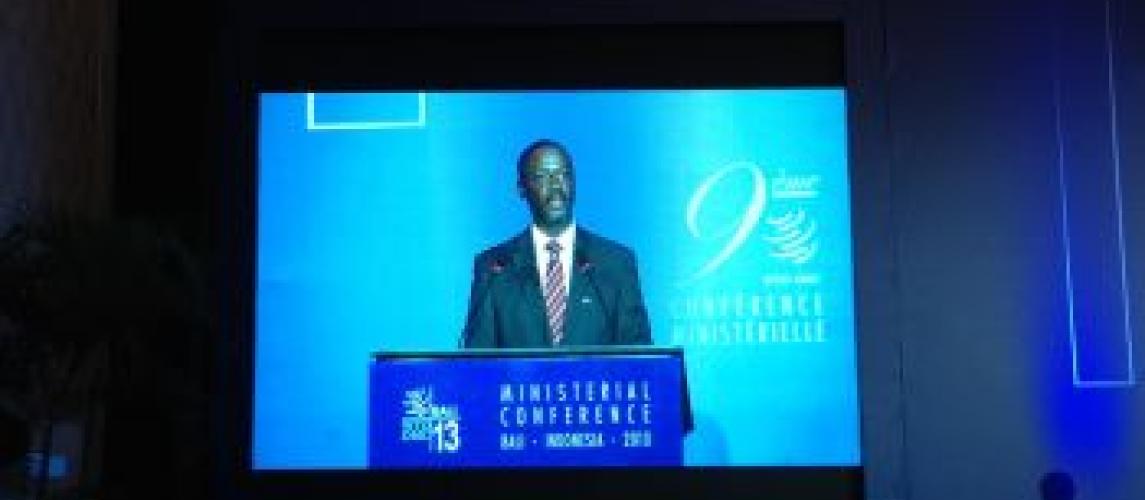
Commerce Minister Hon. Axel M. Addy calls for “flexibility” at the World Trade Organization Ninth Ministerial Conference in Bali, Indonesia
Bali, Indonesia – On Tuesday, 5 December 2013, Liberia’s Minister of Commerce and Industry, Hon Axel M Addy made a case for Liberia at the Plenary Session of the World Trade Organization in Bali. Minister Addy is the first Liberian to address that august body and was right to seize the movement to call the 159 members of the WTO for “flexibility” as Liberia tries to accede to that body during the tenure of H.E Ellen Johnson- Sirleaf.
Minister Addy led Liberia’s delegation to the Ninth WTO Ministerial Conference from December 3-7 2013 and was accompanied by Mr. Stephen Marvie, Assistant Minister for Commerce and Industry and Mr. William Buku, Assistant Commissioner Operational Policy & International Relations of the Bureau of Customs & Excise/Ministry of Finance. While in Bali, Minister Addy was also able to serve on a panel, presenting Liberia’s experience in reference to the support provided by the WTO under the Enhance Integrated Framework (EIF).
Minister Addy also stressed “Liberia remains fully committed to the accession process and desire an early harvest”. In 2007, Liberia submitted its application for membership to the WTO. To build the momentum, Minister Addy and the ITC Executive Director Arancha Gonzalez are currently working on a “Friends of Liberia” Gathering. This would mean a lot for Liberia, both in terms of accelerating the accession and mobilizing huge technical assistant for trade-related issues, such as trade facilitation, standards, etc.
The week-long Conference addressed several issues covering trade facilitation, agriculture and other development programs which will assist the development drive of least developed countries and other developing countries.
On trade facilitation, the conference simplified customs procedures by reducing cost and improving their speed and efficiency. By doing this, trade would be made easier, faster and cheaper. Additionally, there would be reduction in corruption, bureaucracy and increment in technological advancement. Part of the deal involves assistance for developing and least developed countries to update their infrastructure, train custom officers, or for any other cost associated with implementing the agreement.
Relative to agriculture, the participants focused basically on shielding public stockholding programs for food security in developing Countries. One of the key issues addressed was “tariff quota administration”. Members of the Conference agreed on a combination of consultation and providing information when quotas are under-filled.
Finally, the four cardinal developmental decisions which were taken in the previous session in Geneva were also maintained by the participants. Amongst them was the simplification of preferential rules of origin for least developed countries, thereby making it easier for them to identify their own products and qualify them for preferential treatment in importing countries. The other three issues were as follows:
- A “service waiver” which allows least developed countries preferential access to developed counties’ services Markets.
- Duty free, quota free access for least developed countries to export to richer countries; and
- A monitoring mechanism consisting of meetings and other methods for monitoring special treatment given to developing countries.
At the end of the conference, the Ministers reaffirmed their commitment to Aid for Trade, an initiative that assist developing countries, and in particular least developed countries’ trade. They welcomed progress on Aid for Trade since its launch in 2005 and mandated the Director General to continue support for the program.
